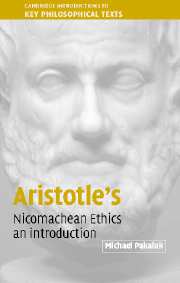Book contents
- Frontmatter
- Contents
- Preface
- 1 Reading Aristotle's Nicomachean Ethics
- 2 The goal of human life (Nicomachean Ethics, book 1)
- 3 Character-related virtue (Nicomachean Ethics 1.13 and book 2)
- 4 Actions as signs of character (Nicomachean Ethics 3.1–5)
- 5 Some particular character-related virtues (Nicomachean Ethics 3.6–4.9)
- 6 Justice as a character-related virtue (Nicomachean Ethics, book 5)
- 7 Thinking-related virtue (Nicomachean Ethics, book 6)
- 8 Akrasia, or failure of self-control (Nicomachean Ethics 7.1–10)
- 9 Friendship (Nicomachean Ethics, books 8 and 9)
- 10 Pleasure (Nicomachean Ethics 7.11–14 and 10.1–5)
- 11 Happiness (Nicomachean Ethics 10.6–9)
- References
- Index
9 - Friendship (Nicomachean Ethics, books 8 and 9)
Published online by Cambridge University Press: 05 June 2012
- Frontmatter
- Contents
- Preface
- 1 Reading Aristotle's Nicomachean Ethics
- 2 The goal of human life (Nicomachean Ethics, book 1)
- 3 Character-related virtue (Nicomachean Ethics 1.13 and book 2)
- 4 Actions as signs of character (Nicomachean Ethics 3.1–5)
- 5 Some particular character-related virtues (Nicomachean Ethics 3.6–4.9)
- 6 Justice as a character-related virtue (Nicomachean Ethics, book 5)
- 7 Thinking-related virtue (Nicomachean Ethics, book 6)
- 8 Akrasia, or failure of self-control (Nicomachean Ethics 7.1–10)
- 9 Friendship (Nicomachean Ethics, books 8 and 9)
- 10 Pleasure (Nicomachean Ethics 7.11–14 and 10.1–5)
- 11 Happiness (Nicomachean Ethics 10.6–9)
- References
- Index
Summary
FRIENDSHIP-FRIENDLY PHILOSOPHY
One of the merits of Aristotle's approach to ethics is that it aims to be practical and, therefore, faithful to how human beings actually are. This surely helps to explain why Aristotle devotes one-fifth of his treatise to a topic that is usually neglected altogether by contemporary moral theory – friendship. We do not often find ourselves having to make a snap decision about how to steer a runaway trolley car. It rarely happens in daily life that we are engaged in delicate surgery and must face the question of whether to carve up a patient for his separate organs, for distribution to other patients who just happen to be prepped for the operating room and waiting to receive them. But friendships and “personal relationships” constitute the very fabric of daily life. If our living well does not depend on the relationships we form with others, and how we typically treat those close to us, then it is difficult to see on what it could depend. And surely Aristotle is correct in holding that any ideal of human happiness must include within it enduring and satisfying friendships: if someone were offered every good thing – wealth, good health, pleasures, and endless life – on the condition that he would be alone, he would not accept the offer (1169b17–18).
- Type
- Chapter
- Information
- Aristotle's Nicomachean EthicsAn Introduction, pp. 257 - 285Publisher: Cambridge University PressPrint publication year: 2005



